This website may contain affiliate links and advertising so that we can provide recipes to you. Read my disclosure policy.
This amazing Korean Beef Bulgogi is easier than you think and doesn’t need any fancy ingredients. It’s a quick dinner that creates the most melt-in-your-mouth, flavorful beef! Perfect for busy families, it’s ready in 45 minutes with only 10 minutes of actual prep and cook time.
We have a lot of beef recipes on the blog that make for fantastic dinner options. Check out Thai Basil Beef, Slow Cooker Korean Beef, One Pot Beef Stroganoff, Garlic Herb Butter Tenderloin.
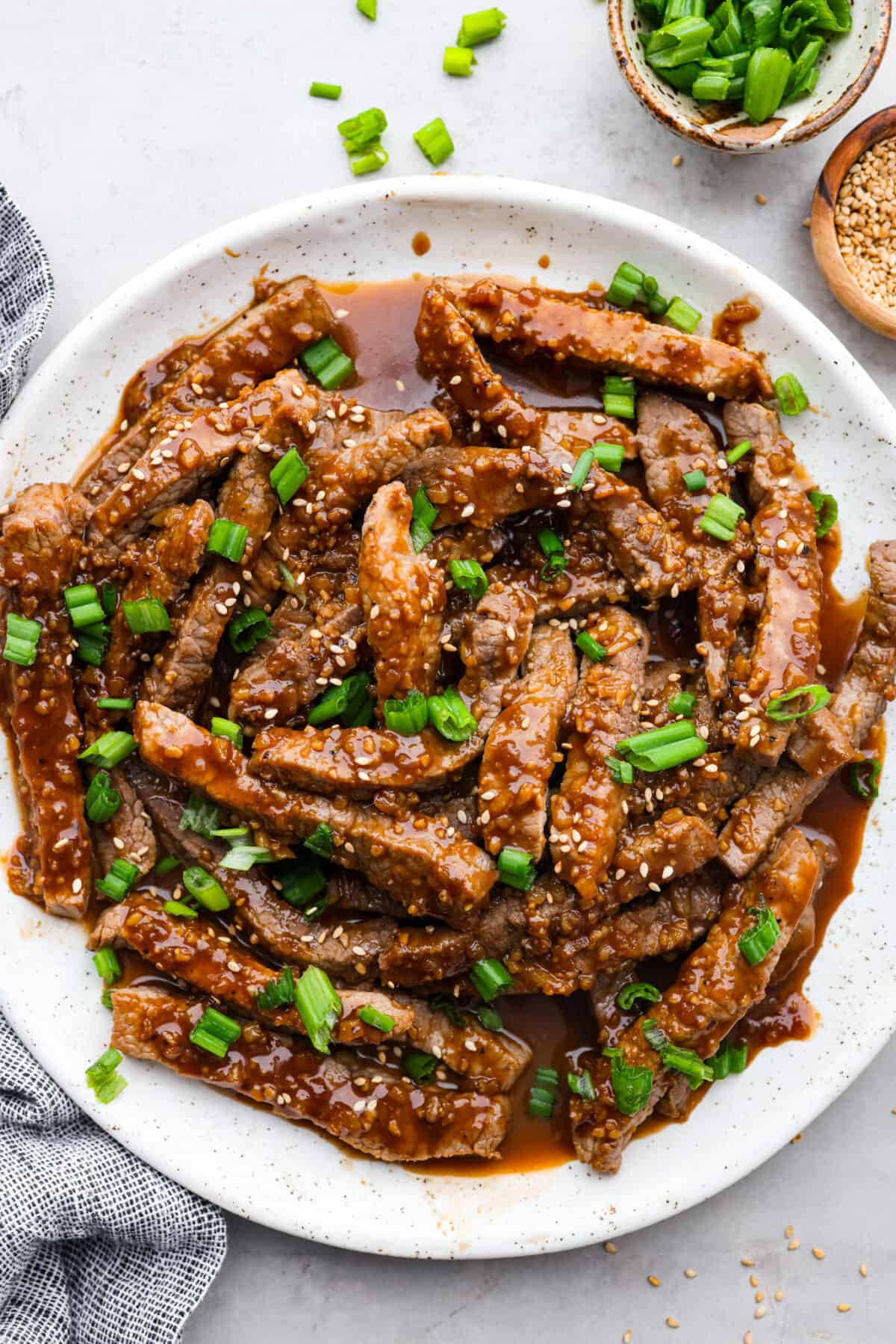
Korean Beef Bulgogi
If you are looking to switch things up for dinner with a recipe that’s easier than it sounds, this Korean Beef Bulgogi is the way to go! This Korean BBQ beef features strips of flank steak marinated to tender perfection in a sweet and savory sauce. Everyone in your family will be raving about it!
Don’t Worry!
This recipe is Picky Eater Approved!
When I wanted to make this at home, I expected a long, complicated recipe with tons of ingredients that are hard to find. Because well, the flavors are so complex and the beef is so insanely tender. But the good news is, this Korean beef bulgogi uses a lot of simple ingredients, most of which you’ll have in your pantry!
Bulgogi Marinade Ingredients
It all starts with the marinade. A lot of recipes ask you to marinate overnight but if you are using beef, 30 minutes is enough in my opinion. (This is what makes this bulgogi recipe so quick and easy!)
- Minced Pear: A staple in Korean cooking, pear is a great meat tenderizer and also adds flavor and sweetness. Normal pears work fine, but if you want a more traditional version of this dish, try using Asian pears! They have a little bit crunchier texture, more similar to an apple.
- Minced Garlic: To infuse the beef with tasty savory flavor.
- Grated Ginger: Keeps the flavor of the bulgogi light and bright.
- Soy Sauce: The foundation of the marinade. Use low-sodium soy sauce if you don’t want things to be too salty.
- Sesame Oil: Adds a nutty savory flavor and keeps things moist.
- Sriracha: For just a touch of heat. You could also sub this out for a little bit of gochujang (Korean chili paste).
- Lime Juice: The acidity helps to make the beef bulgogi extra tender!
- Brown Sugar: Adds a little sweetness to balance out the flavors.
- Seasonings: Onion powder and black pepper to enhance the overall flavor of the marinade.
Other Ingredients Needed:
- Flank Steak: Thinly sliced in strips that are about the same size so they cook evenly.
- Vegetable Oil: For cooking the beef bulgogi in.
What’s the Best Cut of Beef to Use?
I like using flank steak, cut into about 1/2 to 1/4 inch-thick slices. Ribeye steaks are another great option, although they’re on the pricier side.
Cooking Korean Beef Bulgogi
You can either cook this on a grill or on the stove. The slices of beef are really thin so they don’t take long at all to cook. (I’m talking sheer minutes here!) Make sure your grill or skillet is super hot and you have everything ready to go.
- Prepare Marinade: In a large bowl, mix together the minced pear, garlic, ginger, soy sauce, sesame oil, sriracha, brown sugar, onion powder, and black pepper.
- Marinate in Fridge: Add the thin slices of beef to the marinade bowl, cover and allow it to marinate for at least 30 minutes in the fridge.
- Cook in Skillet: Once the beef has marinated, heat a large skillet over medium high heat. Add the oil and some of the beef, in a single layer, on the hot skillet. Cook for about 1-2 minutes on each side. Remove the cooked beef and set it aside while cooking the rest of the beef.
- Serve: Serve over rice, top with sesame seeds if desired, and enjoy!
Don’t Overcrowd Your Pan!
When you cook your beef bulgogi, make sure not to crowd the pan. I like to work in small batches! If you add too many slices of beef at once, they will start steaming and you won’t get that lovely caramelization and smoky flavor that we are looking for.
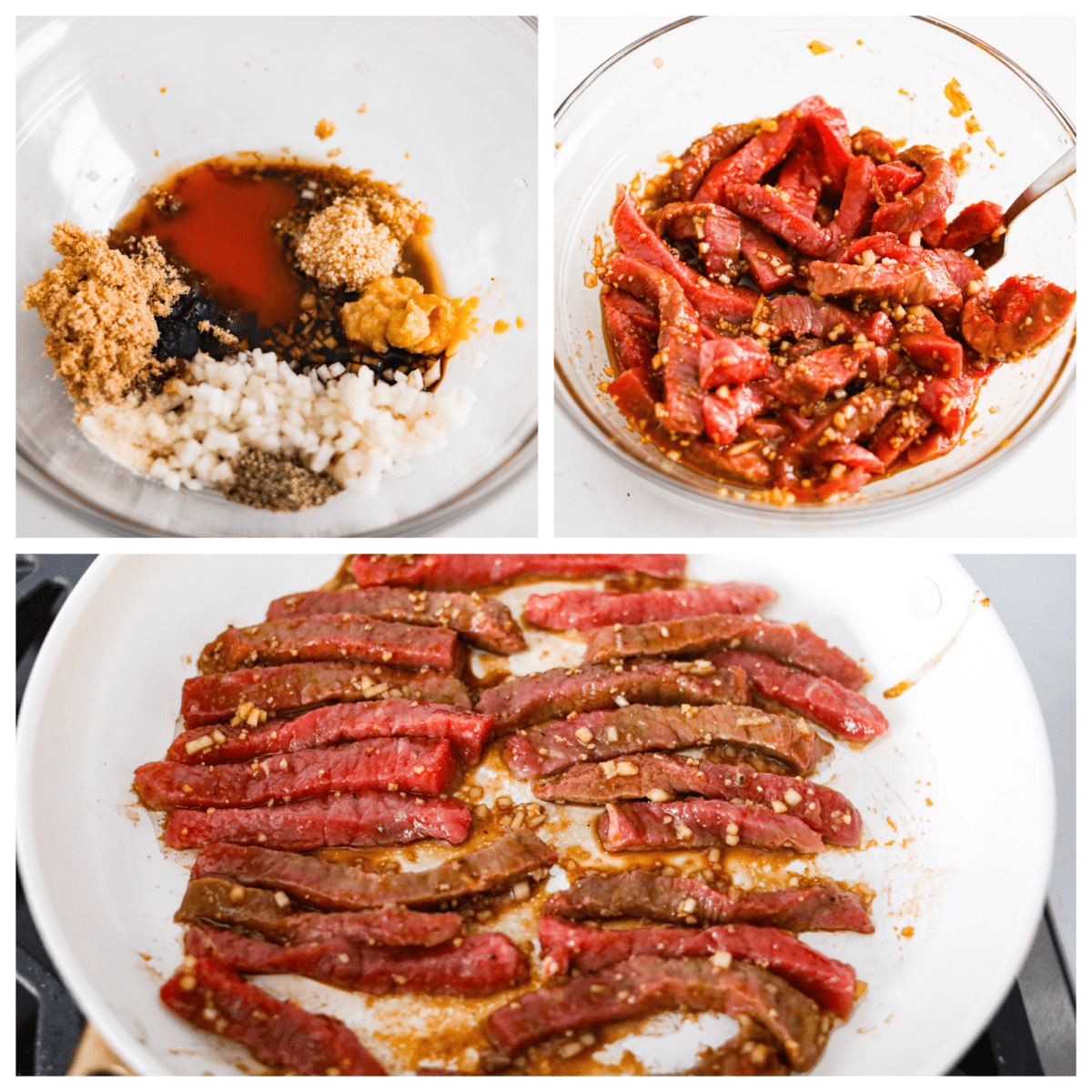
Tips and Variations
A couple extra tips to make this Korean beef bulgogi even more convenient and delicious:
- Marinating Time: You can marinate the meat in the fridge longer than 30 minutes for a richer flavor, but for the sake of time and simplicity I do it just half an hour.
- Serve With: Korean cuisine is all about the side dishes! These are called ‘banchan’ in Korean. I love serving Korean Beef Bulgogi over steamed rice. Then I like to add extra veggies for more color and flavor. Try chopped scallions, kimchi, bean sprouts, pickled radish, cucumber slices, or shredded cabbage.
Try ‘Ssam!’
A common way to enjoy grilled meats in Korea is to wrap them in leafy greens or lettuce. This is called ‘ssam’ which directly translates to ‘wrapped.’ Grab a large piece of lettuce, add a slice or two of bulgogi, some extra sauce if you like, and enjoy! Bonus points if you can eat the entire thing in one bite!
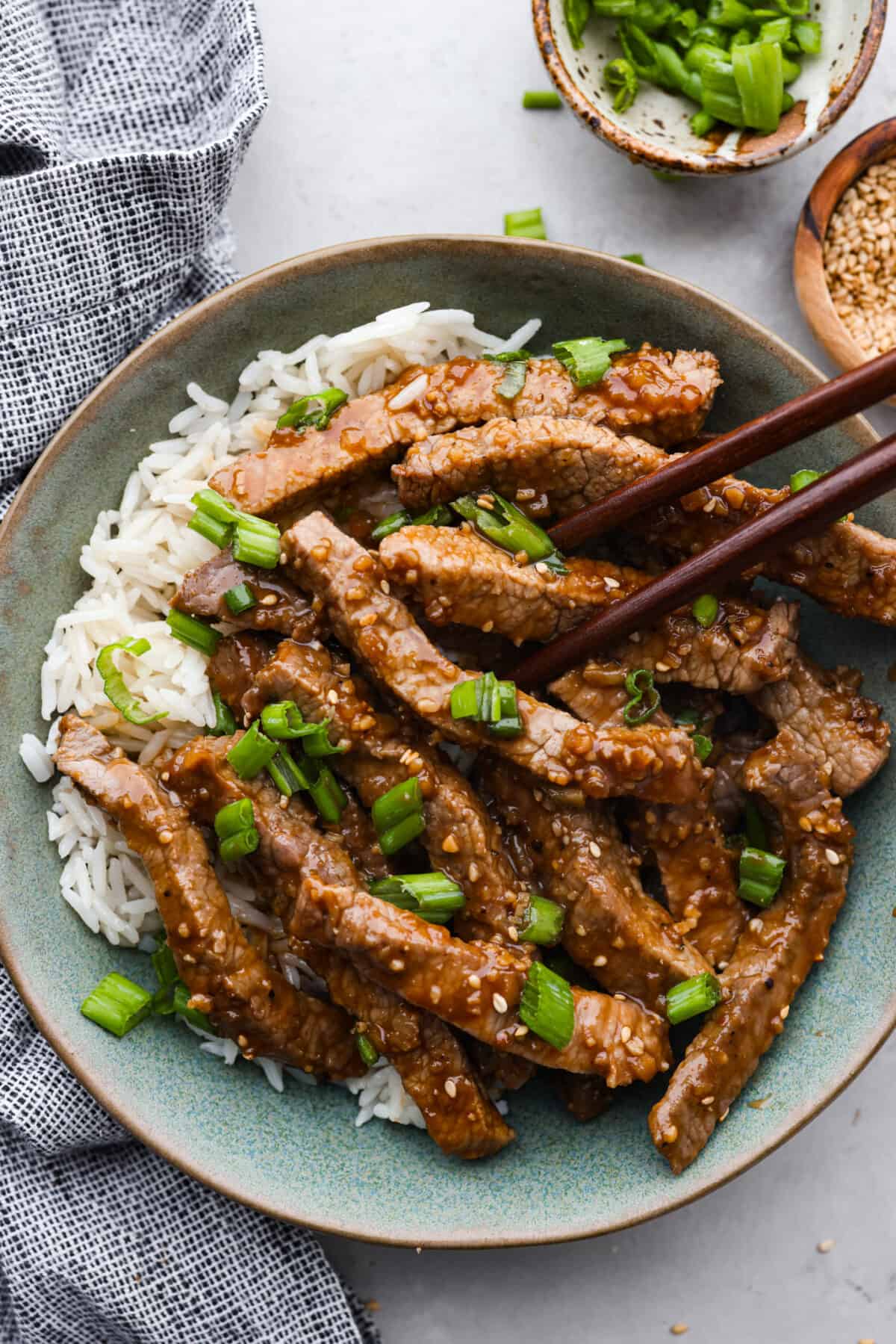
Storing Leftovers and Reheating
Store leftover beef bulgogi in the fridge in an airtight container for up to 4 days. I recommend reheating it over the stove on medium heat to preserve that delicious flavor and texture!
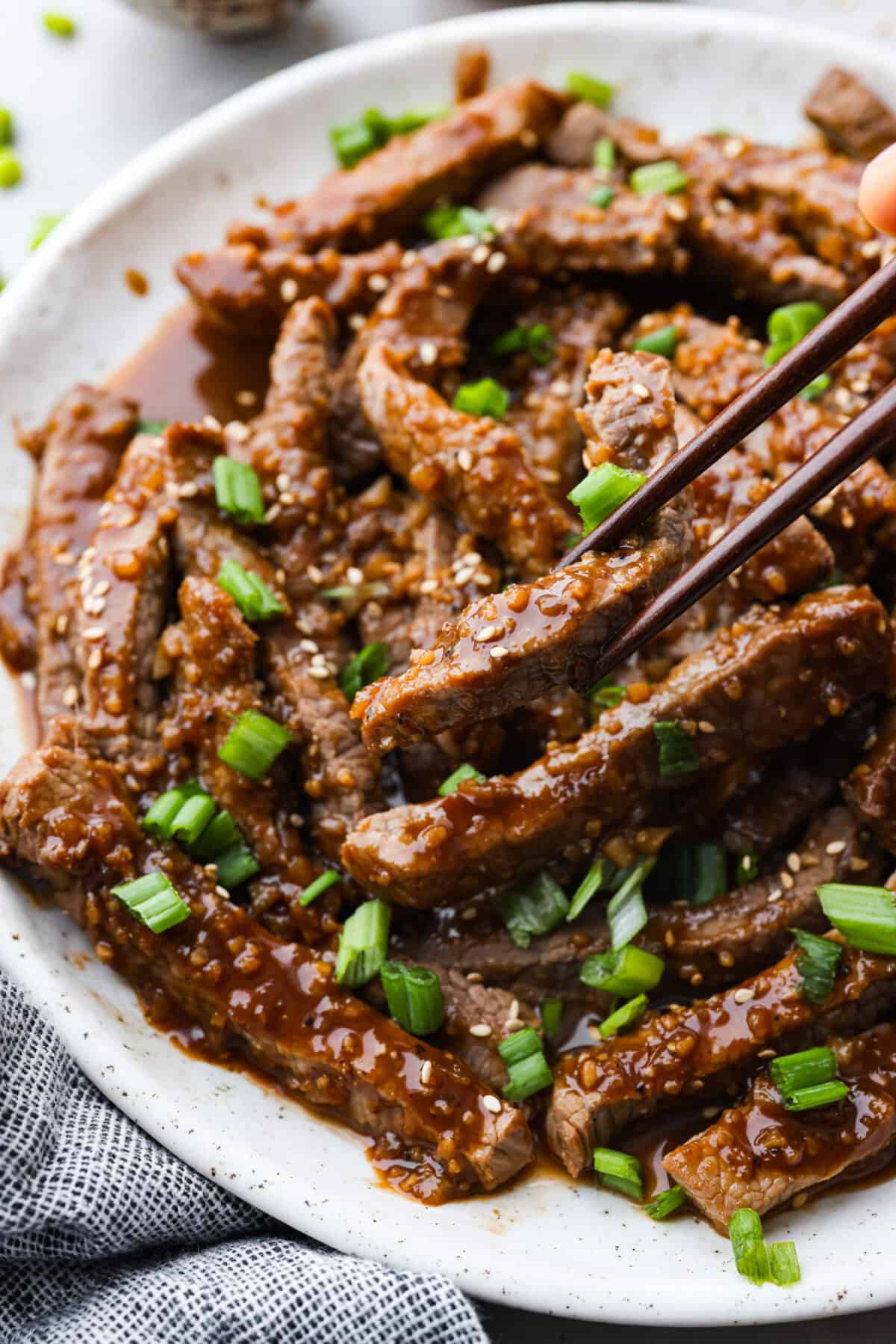
Other Amazing Korean-Inspired Recipes
Pin this now to find it later
-
In a large bowl, mix together the minced pear, garlic, ginger, soy sauce, sesame oil, sriracha, brown sugar, onion powder, and black pepper.
-
Add the sliced flank steak to the marinade bowl, cover and allow the beef to marinate for at least 30 minutes in the fridge.
-
Once the beef has marinated, heat a large skillet over medium high heat. Add the oil and some of the beef, in a single layer, on the hot skillet. Cook for about 1-2 minutes on each side. Remove the cooked beef and set it aside while cooking the rest of the beef.
-
Serve over rice and enjoy!
Updated on February 11, 2024
Calories: 490kcalCarbohydrates: 16gProtein: 51gFat: 24gSaturated Fat: 7gPolyunsaturated Fat: 7gMonounsaturated Fat: 8gTrans Fat: 0.1gCholesterol: 136mgSodium: 1258mgPotassium: 896mgFiber: 1gSugar: 11gVitamin A: 12IUVitamin C: 5mgCalcium: 74mgIron: 4mg
Nutrition information is automatically calculated, so should only be used as an approximation.

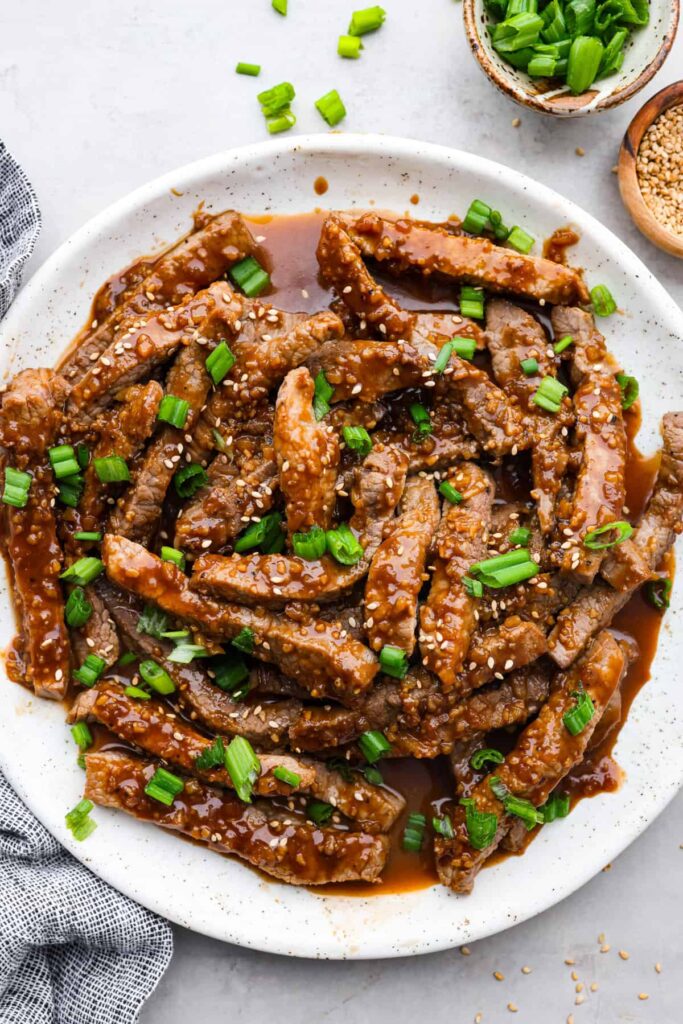
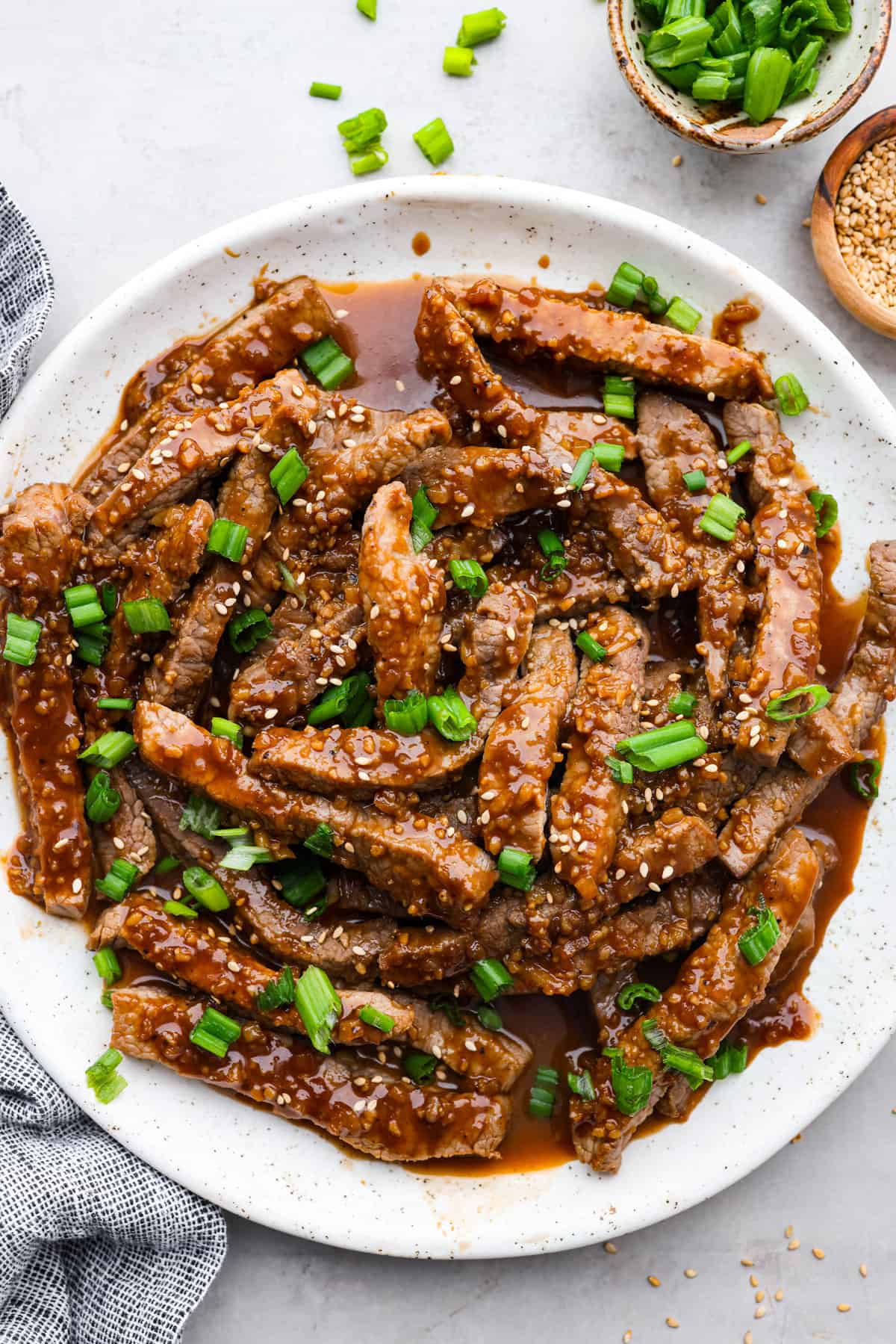






Can you be more specific about the content of your article? After reading it, I still have some doubts. Hope you can help me.